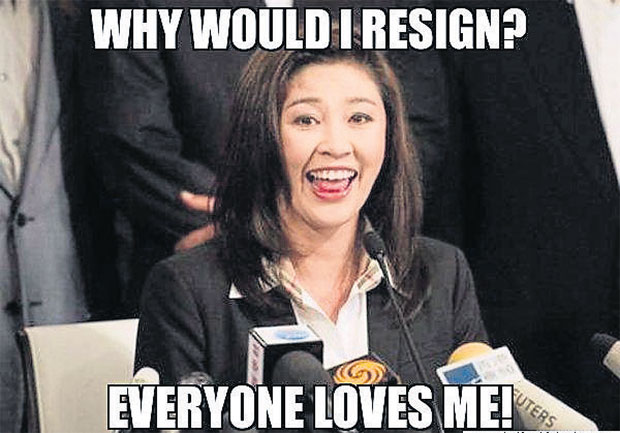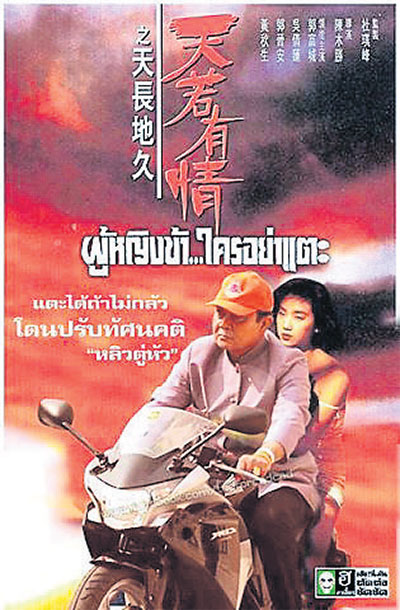Satire can prick, tickle and tease. It can also lighten heavy subjects while still asking hard questions. Sometimes it's just plain juvenile. Satire and politics are inseparable bedfellows — throw in the internet and some Photoshopping skills, and the result is the social phenomenon that Thailand, and the world, is currently witnessing.
World leaders and celebrities from every corner of the Earth have long endured anonymous fun-poking through skilful (although sometimes not) manipulation of image and text. Most take it with a grain of salt, unless it breaches on personal privacy and safety, or is libellous and demeaning. Ask Barack Obama or Kim Jong-un, as they should know what it feels like to be permanent fixtures on the meme circuit.

Former transport minister Chadchart Sittinunt is often portrayed as a superhero. — www.facebook.comchutchartpower
In Thailand, we seem to see a daily dose of comical, acidic, Photoshopped photos making fun of political and social issues, ranging from good-humoured attacks on politicians to caustic memes with witty remarks.
"I think Thailand is under a lot of stress as it is," said Phuphu, one of the most prolific and followed internet satirists who withholds his real name. "Of course, there are things that we're not happy about with the current situation, but I don't see the point of becoming overly aggressive and rude as it only makes us less civilised. I think making mocking memes is more adorable, and less tense," he added.
With a distinct Thai sense of humour that relies on wit, wry word play, visual exaggeration, pop-cultural re-appropriation and twisted (but not vicious) jokes, we have seen such Photoshopped gems as teletubbies being placed in the background of PM Prayut Chan-o-cha's weekly TV address Kuen Kwam Suk (Returning Happiness); or when last week's motorcycle stunt was made into a superhero movie poster as well as a meme in which he's seen riding on a woodpecker's back. Former transport minister Chadchart Sittipunt has been turned into various incarnations of superheroes and fashion models; former PM Yingluck Shinawatra's expressive face was widely mocked and captioned during the big flood in 2011 and during the 2013-2014 protests. Images of controversial figures such as Phra Dhammachayo, Phra Buddha Issara and former MP Chuvit Kamolvisit have also all been cut-and-paste into various jokes.
These satirical manipulations reflect ongoing political and social occurrences without missing a beat, as well as showing glimpses of the ongoing tension and undercurrents towards Thai politics and culture.

From ‘We Love General Prayuth’ Facebook page. — www.facebook.com/weloveprayuth
"Photoshop is my professional tool, and I know how to use it very well, so it comes naturally," said graphic artist Pongsuang Kunprasop, who made satirical LINE stickers to mock the government's official 12 Core Values ones. Pongsuang's stickers, for example, features a girl who says things like "I'll go home in the morning" or "Give me some money".
"It's another way to express ourselves and let our opinions be known," he said.

Yingluck Shinawatra meme. — Thailandfriend.com
Two of the most visited pages for our daily laughs are "We Love General Prayuth" (www.facebook.com/weloveprayuth) where all things political are smartly ridiculed, and "Change Backgrounds For Our Supreme Leader" (www.facebook.com/happybackground) which concentrates on putting the PM against the most surreal and hilarious backdrops. There are many more (and they're still functioning), though these two pages are pioneers specialising in creative tease, photo manipulation, satire and comics as well as welcoming submissions from random internet satirists.
The "We Love General Prayuth" page ominously started on May 22 last year, the day of the coup. It began as an outlet to release frustration, and share jokes among friends. The page administrators never meant it to become public as it is now, with nearly 30,000 followers.

US President Barack Obama as a meme. — Knowyourmeme.com
"At first, we didn't have as many participants as everyone was still very much intimidated by the martial law," said Somchai (not his real name), one of the two active administrators of the page.
"After three or four months, people started to get into it, and our leader began to become more and more funny, which certainly helps push the popularity of our page. We didn't want to become the talk of the town or anything. We surely don't want to stir anything up."

Prime Minister Prayut Chan-o-cha photoshopped onto a movie poster. — www.facebook.com/weloveprayuth
Besides easing stress and lightening up the political mood, satire can also display political standings and inclinations. They can also highlight symbolic resistance — especially to leaders who came to power during the era of the internet, from Yingluck Shinawatra to the current PM.
"It reflects how citizens view their leaders. Let's say, I Photoshop a leader, any leader, as a clown, but the general public holds him/her in high esteem, I would be eaten alive. But if that leader receives little respect, then the citizens will have fun with those photos. I think any leaders should be able to understand that," said Somchai. "You can't expect everyone to agree when it comes to political, social or cultural issues, and to have a healthy society, we shouldn't always agree," said Chatchawan Mansatrakskul, editor in chief of DAMN Magazine, a tongue-in-cheek satire publication. "These manipulated photos are in a way a discussion on a wider scale masked by humour. They can reveal the general feel of the society at any given moment. Then again, there are some that just do it for the fun of it, and they don't have any thought behind them. They just want to make people laugh, and maybe gain followers."

Politician Chuwit Kamolwisit is often ridiculed for his gung ho style. — www.facebook.com/phuphu
All are in agreement that satirical photo manipulations can only succeed when the timing is right, and the wit is sharp. The manipulators must also be knowledgeable enough to reach for past and present references to jumble them up. They must also be fast, and up to date with the latest headline news. The Photoshopped image of PM Prayut on a woodpecker's back combines two viral images of last week: that of the PM straddling a motorcycle, and a wildlife picture showing a weasel on the back of a flying woodpecker.
As with everything else, bad taste and extremism exists alongside creative and light-hearted mockery. Some images contain cruel and libellous messages, and the anonymity of the internet sometimes fuels the rudeness. The hard part, therefore, is to define the line and debate what's acceptable and what's not. So far, no lawsuit has ever been brought to a Photoshop satirist. As a global society, we still can't come to an agreement over "freedom of speech" versus "hate speech", evidenced in the differing views seen in the wake of the Charlie Hebdo massacre. (Charlie Hebdo was sued, but the French court ruled in its favour).

A satirical version of the state-issued LINE stickers, made by Pongsuang Kunprasop. — photo courtesy of Pongsuang Kunprasop
"I'm not keen on those images that are overtly rude, or littered with expletives. They're not very tasteful," said Phuphu.
"To me, disrespecting people's beliefs is not acceptable. Nudity for no apparent reason is also brainless," added Pongsuang.
While the authoritative 1984 Big Brother mood is more pervasive in Thailand than ever, a segment of the cyberworld is still allowed to run free, but one never knows how long it will last. Pongsuang jokingly said that if he were to be called in for one of his artworks, then it would be considered a success.
"Is this resistance? To me, no. It's more like soft teasing. I'm not out to attack anyone, it's just a sense of humour. It's a way of expressing yourself. Think of it as a parody that comes with information," said Phuphu.
"If I were to be reprimanded, I would like to explain my viewpoint, and relay to them that mockery expresses our opinions towards leaders, and they can use that for self improvement. Also, there must be channels for people to express themselves," said Somchai.
"I want the authorities to have fun with what we're doing," he added. "Like I've often said, if we don't love you, we won't tease you. We're not your servants, subordinates or your children. So if we want to coexist, we must learn from one another."
